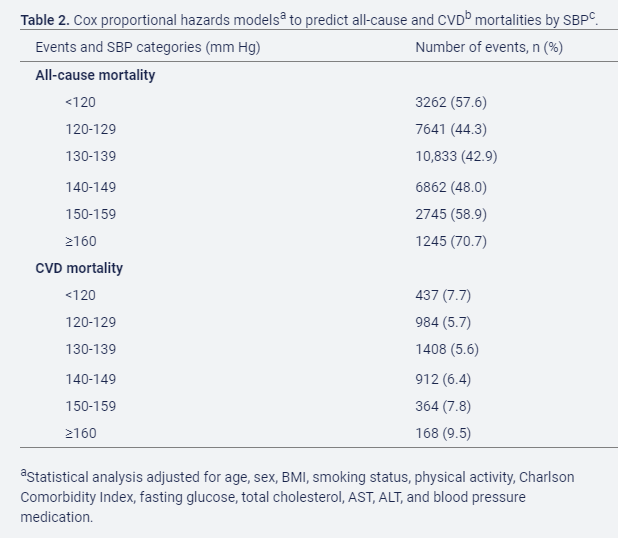Optimal Systolic Blood Pressure for the Prevention of All-Cause and Cardiovascular Disease Mortality
Since losing weight, my SPB is typically 110 to 115 BUT I am on 3 low dose BP meds due to my arterial spasm thing… When I was fat Steve it was typically 120 to 125. So the weight loss made a significant difference without any change in the med dose.
I posted this study because the findings run counter to a widely received view. In this study (Korean population with diagnosed elevated BP) we see a U-shaped benefit curve with the lowest all-cause and CVD mortalities occurring in the 120-139 mm Hg band with mortality increasing in both directions. The lowest mortality band was in the 130-130 mm Hg band. I can think of some explanations but none are determinative or backed by empirical evidence.

Reverse causality would be the first thing that comes to mind (sick/frail people with low BP as a consequence of their illness rather than a cause, similar to the situation w/LDL cholesterol).
Yes, this would be one of a couple of relations to consider. A number of conditions more common in the elderly can be associated with LBP. Beyond that, even though a retrospective study like this doesn’t establish much, it does raise a question about optimality.
This pre-print adds to that perspective with the following clinical conclusions (emphasis mine):
Clinical Perspective
What is new ?
-
The age-related rise in SBP is commonly regarded as inevitable and intensified SBP treatment in older adults is still controversial, as strict BP control in older adults has been related to a higher risk of mortality.
-
Based on a real-world national cohort, an SBP level below 130 mmHg was associated with the highest survival probability to age 90 years in women with or without BP medication.
-
The longer the time women had their SBP controlled at ≥ 110 and <130mmHg, the higher the probability of survival to age 90.
What are the clinical implications ?
-
The age-related BP estimates in conjunction with survival probabilities to age 90 presented clearly emphasize the importance of maintaining well-controlled BP levels even at older age.
-
Preventive measures and risk factor control to ensure a constant relatively low SBP pattern during ageing are warranted.
Low blood pressure can occur in older adults but is generally less common than high blood pressure. Low BP in the elderly without any medications probably indicates that something is wrong,
That’s why I take telmisartan to keep my BP in the desired range.
I used to suffer from postural hypotension, but paradoxically since I’ve been on low dose telmisartan (which has successfully lowered my blood pressure), I haven’t had a single episode of hypotension.
FWIW, Dr Loh says persistent high BP that resists treatment can be caused by sleep apnea. She says she knows lots of skinny people with sleep apnea.